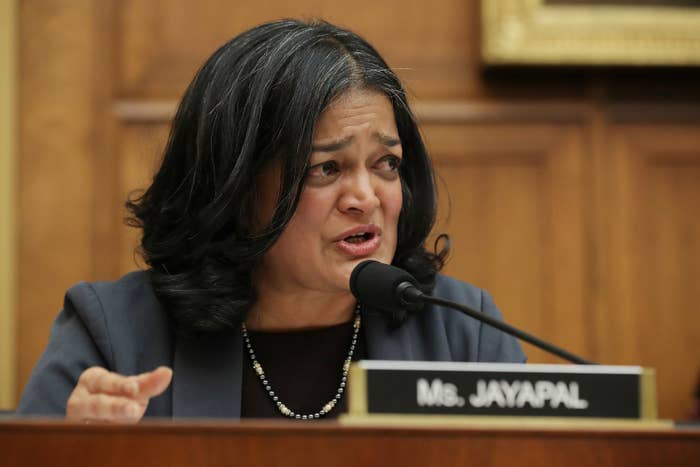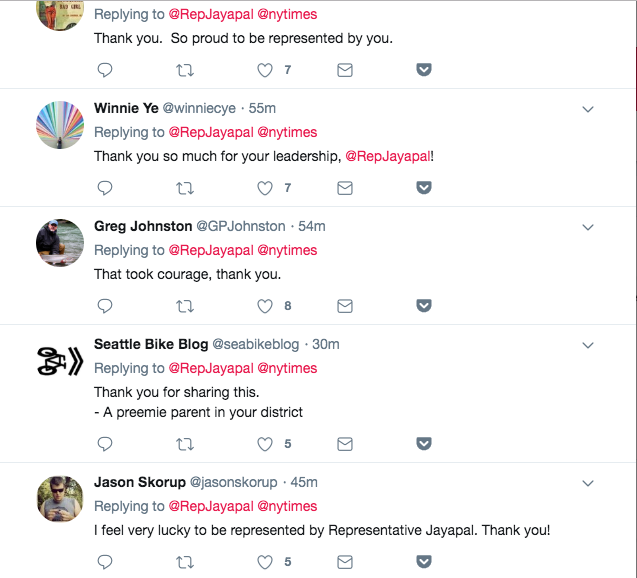
In an op-ed for the New York Times on Thursday, Rep. Pramila Jayapal detailed her decision to have an abortion years ago, making her the second member of Congress to speak publicly about choosing to get the procedure.
Jayapal wrote that she had not publicly discussed it before "because it is an intensely personal decision." But the surge of laws seeking to ban and criminalize abortions now sweeping across the South and Midwest have sparked many women like Jayapal to share their stories.
"For me, terminating my pregnancy was not an easy choice, but it was my choice," Jayapal said. "That is the single thing that has allowed me to live with the consequences of my decisions. And that is what must be preserved, for every pregnant person."
I have never spoken publicly about my abortion. I'm speaking now because of intensified efforts to strip Constitutional rights from pregnant people and to criminalize abortion. I shared my story in an Op-Ed with @nytimes. https://t.co/AjBxRLtBet
In an interview with BuzzFeed News after her essay op-ed was published, Jayapal said her motivation to tell the story "had been building" as white men continued to erode abortion access and try and take ownership over an issue of which they knew very little and continued to spread misleading and false information about.
"I continued to get more and more angry, and then I woke up one day after all this news about the ban and decided that I had been given this platform and I wanted to use it," the Democrat from Washington said. "My stomach was tied up in knots, but after the piece came out and the reactions were people being thankful and grateful that I was normalizing this, I had myself a good cry and now I feel very powerful in my story."
Writing it, even 15 years later, helped her process the experience, she said.
Watching her essay resonate with friends and complete strangers drove home the importance of lawmakers telling their own personal stories. Before her story went landed on Thursday, Jayapal said she finally told her ex-husband, who is now a good friend, and her mom about the abortion.
"Stories are powerful and it's novel to have lawmakers who are willing to tell them," she said. "But sometimes, with courage, that's how it starts and it opens the door for others, if they want to tell theirs, to do so."
Jayapal wrote about her experience giving birth to a child who should not have survived. Born unexpectedly in India weighing a little over a pound, her "miracle" baby required intense constant care. Janak survived, but the pain and stress of taking care of a very sick baby took a toll on Jayapal and her husband, she said.
"I was experiencing postpartum depression, which went undiagnosed for many years," she wrote. "When I finally did seek help from a therapist, she surmised that I also had a form of post-traumatic stress disorder, given everything I had gone through."
She and her husband divorced, and she became a single parent while simultaneously building a civil rights organization. Several years later, she remarried and wanted to have more children. However, her doctors warned her that she would most likely have another extremely high-risk pregnancy and her child could suffer.
"I knew that I simply would not be able to go through what I had gone through again," she said.
Despite taking precautions, she became pregnant and eventually came to the 'heartbreaking" decision to have an abortion to ensure the safety of her body and her future child. She emphasized that it had to — and should — be her decision.
In her op-ed, she notes how she felt lucky that she lived in a state that supports pregnant people's right to choose and that she could rely on a network of people and had a supportive doctor.
Millions of people across the country do not have these basic rights that have become luxuries, she noted:
I respect the perspectives of friends of mine who do not believe in abortion and say they would not choose it for themselves. I never try to convince someone that they should share my views on abortion, and I don’t want anyone to try to do that to me. I also do not begrudge lawmakers who are against abortion for themselves; but as elected officials, they must commit to preserving the constitutionally protected right of others to choose. These reproductive choices — especially in situations involving trauma, be it rape or a desperate prognosis for the baby — are deeply private and personal, and should be made only by the pregnant person.
Although Democrats have been vocal about preserving abortion access and decrying conservative lawmaker's efforts to strip services from their states, only one other representative has ever publicly opened up about her own experience. In 2011, California Rep. Jackie Speier shared that she had an abortion at 17 weeks from the floor of the House.
Jayapal's decision to tell her story garnered gratitude and praise from people across social media, thanking her.

"Thank you for sharing this - it's so important. My daughter was also born severely prematurely & I had an abortion when she was 3 yrs old for the same reasons you did," said author Jessica Valenti. "No one can understand this experience unless you've been through it."
Going forward, Jayapal says that she will continue to advocate and fight for abortion access, especially given the "real chance" that the Supreme Court, especially if Trump has the opportunity to appoint another justice, will overturn Roe v. Wade.
"These folks have bene organized and methodical for some time," she said. "The left just hasn't thought about Supreme Court justices the same way as the right."
The representative also hopes that by sharing her journey, she can visit and speak in some of the states, including Alabama, and connect with people who are struggling to keep abortion accessible.
She also wants people to know that, if women do want to tell their stories, there are people there to listen.
"If they want to share them out of anger, or their own processing, or a desire to build a tapestry of trust across this country of what abortion is," she said. "They should know that there is a really supportive community that is ready to embrace them."
